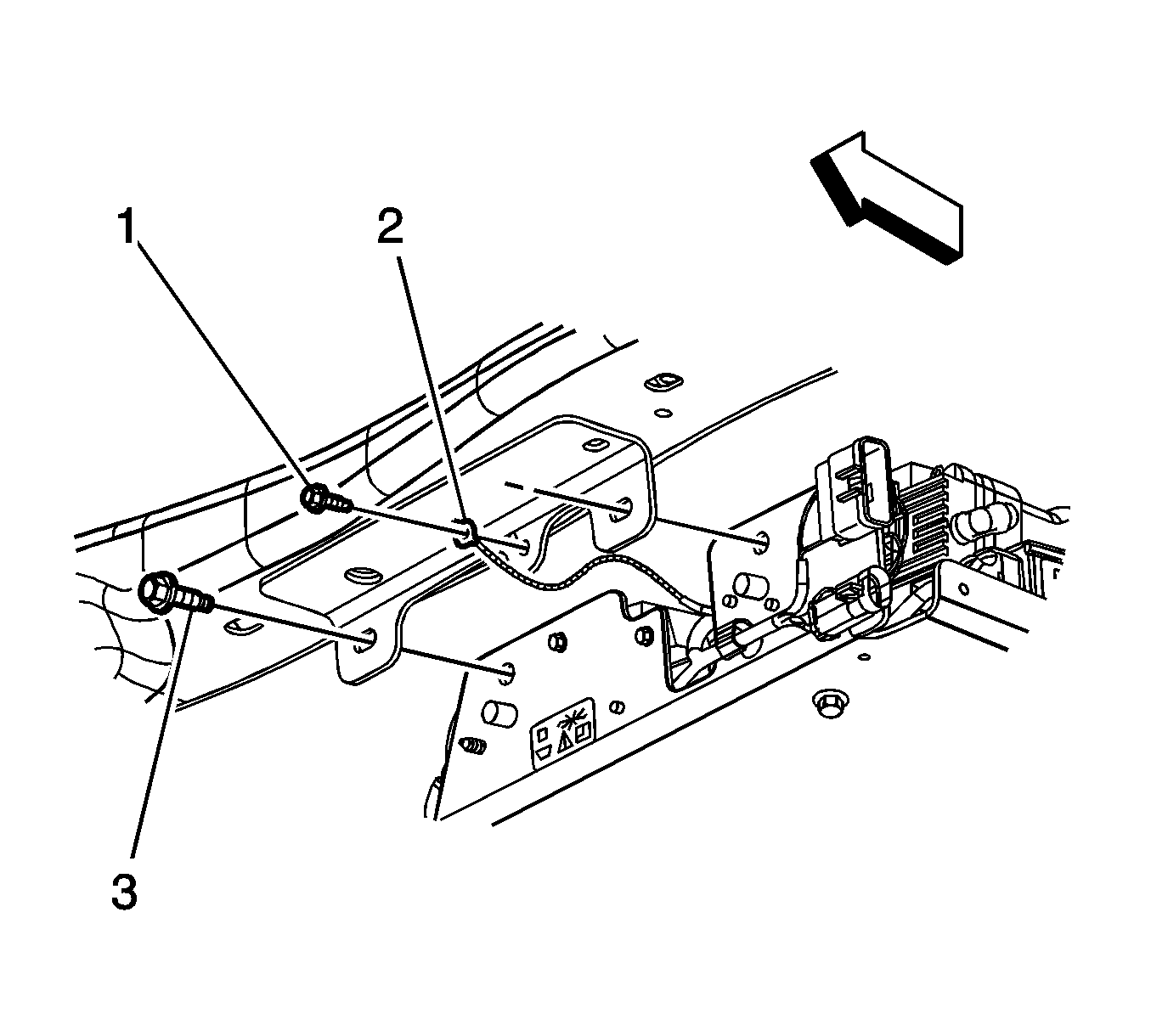Compressor Assembly Automatic Level Control Air Replacement Single Compressor
Removal Procedure
Caution: Do NOT remove an air supply pipe in an attempt to depressurize the air suspension. Always follow the Air Suspension Depressurization Procedure in Air Suspension. Failure to follow this procedure may cause personal injury or damage to the vehicle.
- Depressurize the air suspension system. Refer to Air Suspension Depressurization .
- Raise and support the vehicle. Refer to Lifting and Jacking the Vehicle .
- Support the compressor assembly with a suitable stand.
- Disconnect the air inflator switch electrical connector.
- Disconnect the compressor electrical connector.
- Disconnect the ground strap.
- Remove the rear compressor mounting bolts.
- Remove the front compressor mounting bolts.
- Disconnect the air lines. Refer to Air Suspension Air Line Replacement .
- Remove the compressor assembly from the vehicle.



Important: Note the port location of the air lines for reassembly.
Installation Procedure
- Install the compressor assembly to the vehicle.
- Install the air lines.
- Install the rear air spring compressor mounting nuts and bolts.
- Install the front air spring compressor mounting bolts.
- Connect the air spring compressor electrical connector.
- Connect the ground strap.
- Connect the air inflator switch electrical connector.
- Remove the support from the compressor.
- Lower the vehicle.
- Pressurize the air springs. Refer to Air Suspension Pressurization .
- Start the vehicle and run for approximately 2 minutes to ensure that the air spring leveling system is functioning properly.
- Verify the D height. Refer to Trim Height Specifications .
- Re-calibrate the trim height. Refer to Suspension Position Calibration .
- Check for leaks. If a leak is found at the air supply line connections replace the air supply lines. Refer to Air Suspension Air Line Replacement .
Important: Check the air supply lines for deep scores or cuts. If the air supply lines are damaged the lines must be replaced.
Notice: Refer to Fastener Notice in the Preface section.

Tighten
Tighten the bolts to 50 N·m (37 lb ft).

Tighten
Tighten the bolts to 50 N·m (37 lb ft).

Tighten
Tighten bolt to 6 N·m (53 lb in).
Important: If the rear axle was allowed to hang unsupported, lower the vehicle far enough to allow the air spring to be manually engaged to the support on the axle tube with minimal distortion of the air spring bladder. Ensure that the air spring is fully engaged to the axle support.
Compressor Assembly Automatic Level Control Air Replacement Dual Compressors
Removal Procedure
Caution: Do NOT remove an air supply pipe in an attempt to depressurize the air suspension. Always follow the Air Suspension Depressurization Procedure in Air Suspension. Failure to follow this procedure may cause personal injury or damage to the vehicle.
- Depressurize the air suspension system. Refer to Air Suspension Depressurization .
- Raise and support the vehicle. Refer to Lifting and Jacking the Vehicle .
- Support the compressor assembly with a suitable stand.
- Remove the connector position assurance (CPA) retainer (3).
- Disconnect the air inflator switch and air spring compressor electrical connectors (1, 2).
- Remove the rear compressor mounting bolts (1).
- Remove the ground strap bolt (1).
- Remove the ground strap (2) from the frame.
- Remove the front compressor mounting bolt (3).
- Disconnect the air lines. Refer to Air Suspension Air Line Replacement .
- Remove the compressor assembly from the vehicle.



Important: Note the port location of the air lines for reassembly.
Installation Procedure
- Install the compressor assembly to the vehicle.
- Install the air lines.
- Install the rear air spring compressor mounting bolts (1).
- Install the front air spring compressor mounting bolt (3).
- Install the ground strap (3) to the frame.
- Install the ground strap bolt (1).
- Connect the air spring compressor and air inflator switch electrical connectors (1, 2).
- Install the CPA retainer (3).
- Remove the support from the compressor.
- Pressurize the air springs. Refer to Air Suspension Pressurization .
- Lower the vehicle.
- Start the vehicle and run for approximately 2 minutes to ensure that the air spring leveling system is functioning properly.
- Verify the D height. Refer to Trim Height Specifications .
- Re-calibrate the trim height. Refer to Suspension Position Calibration .
- Check for leaks. If a leak is found at the air supply line connections replace the air supply lines. Refer to Air Suspension Air Line Replacement .

Important: Check the air supply lines for deep scores or cuts. If the air supply lines are damaged the lines must be replaced.
Notice: Refer to Fastener Notice in the Preface section.
Tighten
Tighten the bolts to 50 N·m (37 lb ft).

Tighten
Tighten the bolts to 50 N·m (37 lb ft).
Tighten
Tighten bolt to 6 N·m (53 lb in).

Important: If the rear axle was allowed to hang unsupported, lower the vehicle far enough to allow the air spring to be manually engaged to the support on the axle tube with minimal distortion of the air spring bladder. Ensure that the air spring is fully engaged to the axle support.
